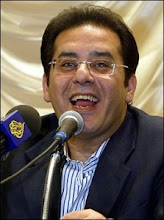 Ayman Nour giving interview to VOA (03 Jun 2009)
Ayman Nour giving interview to VOA (03 Jun 2009)Egyptian authorities recently banned opposition leader Ayman Nour from traveling to the United States where he was invited to speak to several organizations. While Egyptian authorities say the ban is lawful, Nour's supporters say it is the latest in a series of moves aimed at marginalizing opposition groups ahead of next year's parliamentary elections.
Ayman Nour, the main challenger to President Hosni Mubarak in Egypt's first multi-candidate presidential election in 2005, is no stranger to political pressure.
He founded the opposition el Ghad party, created to represent a liberal democratic perspective, with a strong interest in human rights. Nour used the party as a platform to call for constitutional reform, limiting the president's powers and opening presidential elections to multiple candidates.
The opposition leader was recently blocked by Egyptian authorities from traveling to the United States to attend conferences at the Carnegie Endowment for Peace and other groups.
The U.S. State Department has called on the Egyptian government to reconsider its ban.
Nour says he has been barred from teaching at any state universities. He says he cannot access his bank accounts and cannot participate as a candidate in any elections. He was also jailed shortly after the 2005 elections on charges of forgery and spent over three years in prison before being released in February in what he describes as a ploy to get him out of politics.
Egyptian authorities say the travel ban was a condition of his early release from prison. Nour disagrees. A lawyer by profession, he says he knows his rights and is not giving up.
He says that opposing political corruption, particularly the kind of corruption he's seen after the elections and since his arrest, is not a choice, but a duty.
Cairo University professor and member of the ruling National Democratic Party's advisory committee Mohamed Kamal rejects Nour's claims and says the politician has plenty of freedom.
"I think there is some exaggeration in these accusations," Kamal said. "Ayman Nour is free to engage in whatever campaign he wants to engage in. He has access to the people. He has access to the media. Maybe the question he doesn't ask himself is whether this cause that he carries the flag (for) is popular among Egyptians or not."
Other opposition groups say they, too, are hampered in their attempts to participate openly in Egyptian political life. Not far from Kamal's office, Muslim Brotherhood students at Cairo University protest moves they say are aimed at keeping them out of the student union elections.
On the national level, the Muslim Brotherhood are banned from officially putting forth candidates for election. The Egyptian constitution forbids political parties based on religion. The group has done well despite the law, with 88 members who ran as independents now in parliament.
According to Muslim Brotherhood lawmaker Akram Shaar, there are concerted efforts by the ruling party to keep opposition groups at bay.
He says everyone ranging from opposition groups, the mainstream and everyday honest citizens who love their country are prevented from taking part in a true and open dialogue. He said they are also prevented from taking part in elections and from having their opinions heard.
In a wider effort to keep up pressure on Egypt's ruling party, Nour joined forces with the Muslim Brotherhood and several other opposition groups to launch a campaign called Did Al-Wirasa, meaning "against inheritance." Its name is a reference to the president's son, Gamal Mubarak, head of the National Democratic Party's policies committee, who is widely seen as being groomed to take over from his father.
Nour says that it is every citizen's right to choose and to be a part of the country's decision-making process. He says the new campaign is aimed at curbing any decisions taken without the people's vote. Nour says people want to choose who rules them.
81-year-old President Mubarak, who has been in power for 28 years, has yet to say if he will seek another six-year term in office. Likewise, his son has not announced his plans. But many believe that what takes place in next year's parliamentary elections will set the tone for what happens in the 2011 presidential vote.
[http://www1.voanews.com/english/news/a-13-2009-11-11-voa21-69822552.html]




No comments:
Post a Comment